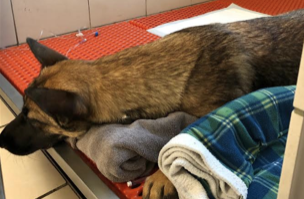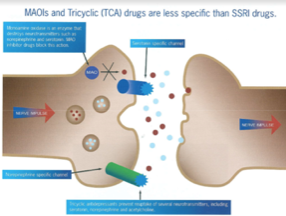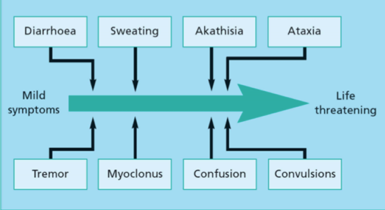Serotonin Syndrome
Written by Cristina Aponte Colon, 3rd year veterinary student • 2019 Scholar
History & Physical Exam

Hilda is 7 month-old, intact female German Shepard. She presented to Iowa Veterinary Specialties on July 28, 2019 after having ingested 15-20 200mg 5-HTP capsules. 5-Hydroxytryptophan is an over the counter human supplement. She was not on any current medications, nor she did she have any significant medical history. Upon arrival, Hilda was in lateral recumbency, dilated pupils, unable to stand and in respiratory distress.
- Hyperthermia (high body temperature)
- Muddy pink, tacky mucous membranes
- Prolonged capillary refill time
- Increased respiratory rate
- No response on pinch test
- No anal tone present
- No reflexes present
On her neurological examination, she was mentally inappropriate. Her pupillary light, menace, and dazzle reflexes were all absent. She was unable to swallow and there was no gag reflex present. There were evident tremors throughout her body. The rest of Hilda’s physical exam was unremarkable.
Drug Mode of Action

Monoamine oxidases (MAO) catalyzes the breakdown of monoamines, including norepinephrine, 5-hydroxytryptopham, and dopamine. MAO is present in the liver and it facilitates the breakdown of tyramine rich foods. In the absence of MAO action, tyramine rich foods accumulate leading to hypertensive crisis. 5-HTP is a type of monoamine oxidase inhibitor, a drug less specific than serotonin selective reuptake inhibitor drugs. 5-HTP is a serotonin precursor that bypasses the rate limiting steps to get into the central nervous system.
Diagnosis
Diagnosis of serotonin syndrome is based on history and clinical signs. A Gas Chromatography/Mass Spectrometry for medication in the blood can also be performed to confirm the presence of the drug in the dog’s system. The most important parameters to monitor in dogs that have ingested 5-HTP are blood pressure, body temperature and heart rate.
- Bloodwork- Hilda has an increased total bilirubin, increased mean platelet volume (MPV), and increased phosphorous.
Serotonin Syndrome
Serotonin syndrome is a drug-induced syndrome due to elevated serotonin levels in the central nervous system. Dogs are more susceptible than other species to developing serotonin syndrome.
Clinical signs of serotonin syndrome include the following:
- Central nervous system: agitation, restlessness, vocalization, confusion, seizures
- Gastrointestinal: abdominal pain, vomiting, diarrhea, salivation
- Neuromuscular: muscle rigidity, tremors, ataxia, shivering
- Cardiovascular: tachycardia, hypertension
- Others: sweating, hyperthermia, tachypnea, transient blindness
The syndrome onset ranges from 30 minutes to 12 hours post ingestion of the drugs. Duration of the symptoms with treatment ranges from 24 to 72 hours. Extended signs correlate to large ingestions of multiple meds. The risk of developing serotonin syndrome increases with dose.

Treatment

Treatment is generally symptomatic and supportive. Serotonin syndrome is a potentially life-threatening condition that requires aggressive intervention.
- Phenobarbital (preferred) or diazepam - treat seizures
- Phenothiazines – treat agitation
- Cyproheptadine (serotonin antagonist)
- Given orally or rectally
- Intravenous fluid to hydrate and cool patient – treat hyperthermia
- Anti-emetics – treat vomiting
- Methocarbamol - treat the tremors
- Centrally acting muscle relaxant
- Adverse effects: sedation, salivation, emesis, lethargy, weakness and ataxia
- IV methocarbamol has been found useful in treating tremors and muscle fasciculations associated with various toxicities in dogs and cats
- Opioids such as fentanyl and tramadol can make the serotonin syndrome worse
Recovery and Outcome
Prognosis for serotonin syndrome depends on amount ingested, duration of clinical signs and agent ingested. Given that she ingested a “pure” serotonergic agent (5-HTP), rather than an agent with additional effects such as tricyclic antidepressants, she recovered very well. Hilda was hospitalized at IVS for 72 hours.
References & Citations
- Plumb, Donald C. Plumbs Veterinary Drug Handbook. PharmaVet Inc., 2018.
- Gwaltney-Brant, Sharon. “Serotonin Syndrome .” VIN, www.vin.com/Members/Associate/Associate.plx?from=GetDzInfo&DiseaseId=5367.


